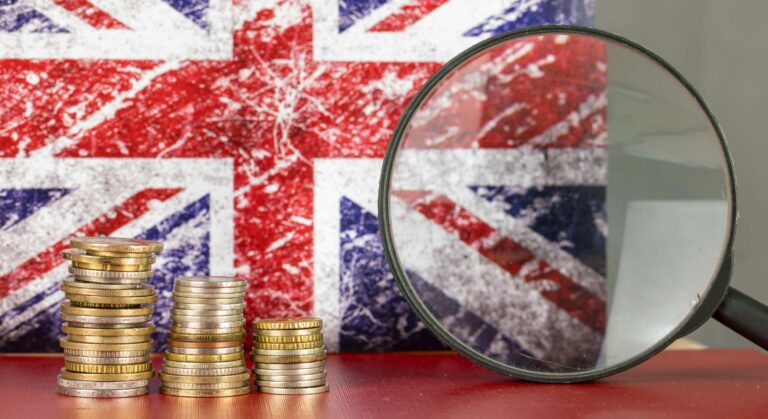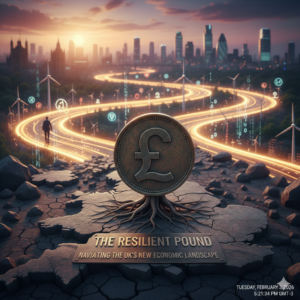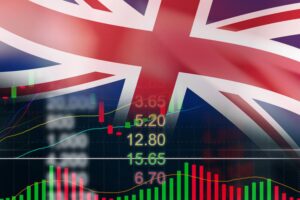
The UK Economy: A Manual of Applied Economics
The United Kingdom (UK) has traditionally maintained a reputation as one of the world’s largest and most influential economies. It should also be noted that the UK has a relatively wide spread of business activities, from financial services to manufacturing and a base of international trading. But just like everything economy, it has its hurdle factors that help project the performances of the economy. This paper investigates the anatomy, vigour and policy challenges facing the UK economy, articulating in detail the factors that underpin its growth and stabilities.

Historical Context
The UK was the world’s first industrialised country and its economy remains one of the largest still to this day. London became one of the world’s leading financial centers, and industries like textiles, shipbuilding and coal mining drove economic expansion. Eventually, though, the country turned from heavy industry toward services, in the kinds of work that Americans who voted for Mr. Trump have called “elitist nonsense:” finance, education and technology.
This shift has shaped a lot of the modern UK economy. Manufacturing is still important, but it has become less important relative to sectors like services are today.
Key Sectors of the UK Economy
Services Sector
The Uks services sector is the largest in the economy, representing about 80 percent of its GDP. Financial services are particularly important in this industry. The London Stock Exchange and the Bank of England, as well as a large number of other businesses, are based there.
The education, health, tourism, and creative sectors (such as film and television) are also significant employers. The likes of Oxford, Cambridge, the London School of Economics also draw on international students, which is good for the economy in terms of education.
Manufacturing and Industry
Manufacturing plays a smaller role than it has in the past, but it remains significant. The UK is famous for its car industry, which includes makers such as Rolls-Royce, Jaguar Land Rover and Mini. Aerospace is another of its strengths, with Airbus and BAE Systems contributing to exports.
The pharmaceuticals and biotechnology are also vital and are underpinned by cutting-edge R&D. Leaders in healthcare innovation, as evidenced by companies like GlaxoSmithKline and AstraZeneca.
Energy Sector
The UK has long been dependent on North Sea oil and gas, but the fields have long passed their peak. Renewables, itself a more recent development as a focus of attention, has risen. The UK has become one of the largest producers of wind energy in Europe, especially offshore wind power. The shift toward cleaner energy is a key part of the country’s pledge to cut carbon emissions and combat climate change.
Agriculture
Agriculture contributes little to GDP but remains essential for domestic food supplies and rural employment. The UK grows cereals, sheep and cattle, but is a net importer of food. Sustainable farming in the sector is promoted by current farming methods, as well as government policy etc.
Trade and International Relations
The UK is an historic trading nation. Products it sells to other countries include machinery, vehicles, pharmaceuticals and financial services. The EU, the US and China are important trading partners.
The departure of the United Kingdom from the EU (Brexit) altered its trade relations. Brexit gave the UK the freedom to make our own trade deals, but also added new checks such as customs barriers and regulatory changes. New trade agreements with partners such as Australia and Japan are part of the government’s approach to widen international alliances.
Employment and Labour Market
The labour market is flexible in the UK, millions in service, manufacturing and public sectors are working. Unemployment rates have been low over all, though wage growth and job security have varied widely by industry.
The gig economy has expanded in recent years, as more workers took up freelance, short-term or app-based jobs. This has sparked conversations about job security, workers’ rights and the conflict between flexibility and stability.
Public Finances and Fiscal Policy
The government also has an important responsibility for the economy through taxation and spending. Healthcare, education and social welfare services through the National Health Service need funding.
The COVID-19 pandemic prompted record government borrowing as emergency measures shielded businesses and households. While unavoidable, this has raised public debt, and fueled discussions on how to address long-term fiscal sustainability.
Monetary Policy and Inflation
The Bank of England supervises monetary policy, among other things controlling interest rates and regulating inflation. Recent years have seen a major focus on the issue of inflation, propelled by global supply chain distortions and soaring oil as well as fluctuating currencies.
One tool in the arsenal to fight inflation is raising interest rates, but that also increases borrowing costs for households and businesses. Maintaining the equilibrium between stability of prices and growth is a fundamental challenge to the policy makers.
Regional Differences within the UK
The society and economy of the UK is varied across regions. London and the South East is generally wealthier thanks to services and high-value industries. In contrast, most regions in the North of England, Wales and parts of Scotland have had higher unemployment and lower average incomes.
Efforts such as the government’s “levelling up” agenda seek to diminish these inequalities by investing into infrastructure, education and regional development.
Current Challenges
In the U.K., the economy is also grappling with stiff headwinds:
Brexit Adapting: Firms are adjusting to life after Brexit.
Inflation and Cost of Living: High prices are squeezing households.
Energy Transition: A transition from fossil fuels to renewable energy needs investments.
Productivity Growth: Productivity has been trailing other advanced economies.
Uncertainty Related to the Global Environment: The geopolitical climate and changes in the global market influence trade and investment.
Future Outlook
The UK economy still has a considerable number of attributes in its favour, even as weak spots emerge. Its robust financial services, leading universities and creative industries offer a solid base for the future. Digitalization, green technology and life sciences are areas of expansion and global leadership.
Public policies around innovation, skills evolution, sustainability will be key in the future. The UK has the potential to remain an influential and powerful economy on the world stage, provided its transition to the emerging global order is properly and effectively navigated.
🎯 Conclusion:
The United Kingdom’s economy is dynamic, resilient, and deeply connected to global markets. From its historical industrial roots to its modern reliance on services and innovation, it reflects both tradition and transformation. While the nation faces challenges such as inflation, regional inequality, and post-Brexit adjustments, it also has remarkable opportunities in technology, finance, and sustainability.
For businesses, investors, and individuals, understanding the UK economy provides valuable insight into one of the most important players in the global economic landscape.
Our Post


The Resilient Pound: Navigating the UK’s New Economic Landscape


